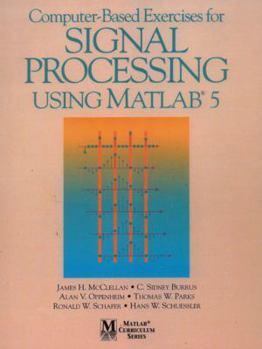Computer-Based Exercises for Signal Processing Using MATLAB Ver.5
FEATURES: *Presents many computer-based problems that can be done in conjunction with a course in DSP theory. *Projects relate to practical systems and implementations so the reader can learn and... This description may be from another edition of this product.
Format:Paperback
Language:English
ISBN:0137890095
ISBN13:9780137890095
Release Date:November 1997
Publisher:Pearson
Length:408 Pages
Weight:2.15 lbs.
Dimensions:0.9" x 8.5" x 10.9"
Customer Reviews
3 ratings
A collection of DSP exercises, NOT a textbook
Published by Thriftbooks.com User , 20 years ago
This book is, as the title says, a collection of DSP exercises. What little mention there is of theory, is basically mere keywords and hints to more theoretical textbooks. The student is also expected to have a working knowledge of MATLAB. The focus of the book is getting hands-on experience with DSP, using MATLAB as a very convenient tool to this end. The authors mention that the intended audience is senior undergraduates and first-year graduate students. I'm not sure if I understand the American educational system, but I think that means the audience of this book is expected to have at least two semesters of basic DSP training. The book is organized in 12 chapters. The chapters are divided into sections that treat more detailed issues. The chapter and section headings are: 1 Basic Signals and Systems - Signals - Difference Equations - Fourier Transform: DTFT - Group Delay - Basic Sampling Theory - Zero-Phase IIR Filtering 2 Discrete Fourier Transform - DFT Properties - DFT as a Matrix - Convolution: Circular and Block - Related Transforms 3 Spectrum Analysis - Spectral Windows - Sliding-Window DFT - Narrowband Signals 4 Multirate Processing - Bandlimited Interpolation - Zoom Transform - Rate Changing 5 Systems and Structures - Systems and Structures 6 Stochastic Signals - Stochastic Signals - FFT Spectrum Estimation - Modern Spectrum Estimation 7 Wordlength Effects - Wordlength Effects 8 Discrete-Time Filter Design - Discrete Design of FIR Filters - Least-Squares Design of FIR Filters - Chebychev Design of FIR Filters - Design of IIR Filters 9 DFT and FFT Algorithms - Direct Calculation of the DFT - The Cooley-Tukey FFT - Prime Factor FFTs - General-Length FFTs 10 Applications - Radar Simulation - Introduction to Speech Processing - Speech Modeling - Speech Quantization 11 Signal Modeling - Linear Prediction - Linear Prediction of Speech - Exponential Modeling - Signal Estimation - Least-Squares Inversion 12 Appendix A: Software and Programming NotesEach section is divided into a number of projects which, in turn, are divided into a number of exercises.To get an impression of the level these exercises hold, consider the section "Least-Squares Design of FIR Filters" in chapter 8. The section is divided in the projects Project 1: FIR Filter Design by Least Integral Squared Error Approximation Project 2: Design of High-Pass, Band-Pass and Band-Reject Least-Squared-Error FIR Filters Project 3: FIR Filter Design Using Window FunctionsThe two first exercises of project 3 are (p 269):=====================================================Exercise 3.1: Design a Low-Pass Filter Using Windows Design a length-23 linear-phase FIR low-pass filter with a band edge of w0 = 0.3pi using the following windows: a Rectangular b Triangular or Bartl
Excellent Applications Book
Published by Thriftbooks.com User , 23 years ago
I have the previous edition of the book (Using Matlab 4) and this review is on that version... I find this book to be an excellent APPLICATIONS book. It is not intended to be a Matlab Primer; you are supposed to know Matlab programming already. It is also not intended to be a DSP Primer. This book takes the basic DSP knowledge you already have and allows you to expand on it by applying it to a variety of real problems, like radar ranging or speech processing or filtering. It also deepens your knowledge by giving you drill problems that go deep into the workings of the DFT and other basic DSP tools. I had the good luck of taking a couple of DSP courses with McClellan and Schafer when they were writing this book and they used to hand problems from the book as special homework after they had taught the underlying material. Doing these exercises after you know the basics is an excellent way to cement that knowlege and become more proficient both in matlab and in problem solving.
Pretty good concepts, but needs to be supplemented.
Published by Thriftbooks.com User , 25 years ago
No complaints about the contents, or how it's presented. It did at times leave you wanting another example or two. It also didn't introduce Matlab as well as others . I found "Computer Explorations in Signals and Systems" a useful companion. I gave it 4 stars instead of 3 because there is very little competition.





